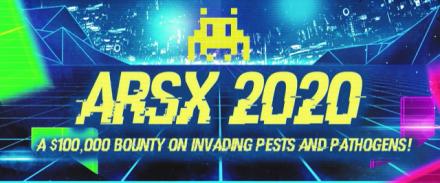ARS Takes on Disruptive Pests in Hackathon

Since its inception, the Agricultural Research Service (ARS) has been an institution that represents not only cutting-edge advancements in science but also innovation and creativity in finding solutions to some of the world’s biggest agricultural problems.
Building on its reputation as an innovative leader, ARS is launching its first-ever Hackathon – an agency-wide competition dubbed ARSX2020 – which aims to unite our best and brightest talents to catalyze breakthroughs on our most challenging agricultural issues. The topic for the Hackathon is disruptive pests and pathogens that threaten our agricultural yields, our resources, and our health.
“ARSX2020 has a more interactive quality than more conventional avenues of research,” explained Pamela Starke-Reed, Deputy Administrator in the Office of National Programs, in Beltsville, MD. “We established ‘disruptive pests’ as this year’s problem because they’re universal issues that are generally applicable to any field, from food to forestry. ARSX2020 brings people together from all across our National Programs, allowing us to get the best ideas from our scientists regardless of their specialties or field of research.”
Out of the 68 completed applications received since early February, 10 were selected as finalists for participation in the Hackathon, scheduled for May 27, 2020. The Hackathon will serve as an important opportunity for researchers to develop and pitch their ideas to a panel of expert judges. Of the top projects, up to three winners will be chosen; they may each receive up to $100,000 in prize money along with the chance to network and consult with scientists from across ARS.
“We want ARSX to provide a chance to think laterally, to get excited about applying your skills to novel problems, and to inspire the ARS community to embrace innovation and think more entrepreneurially,” said Jeff Silverstein, Deputy Administrator in the Office of National Programs.
Teams are evaluated by their proposal’s potential impact, novelty, feasibility, and cross-team collaboration.
“Hopefully, ARSX will create a new culture of problem-solving within ARS,” said Mojdeh Bahar, who leads the ARS Office of Technology Transfer. “We’ve seen the successes of similar collaborative platforms in other industries, where ideas generated by people from multiple backgrounds provided a broader perspective, multiple inputs and answers to a single question. This paradigm is very different than incremental research. The Hackathon is dynamic and tech agnostic – it helps us stay open to the use of different and unconventional tools to solve different problems.”
Stay tuned for live updates during the ARS Hackathon on Twitter, Facebook, and LinkedIn! – by Georgia Jiang, ARS Office of Communications.

